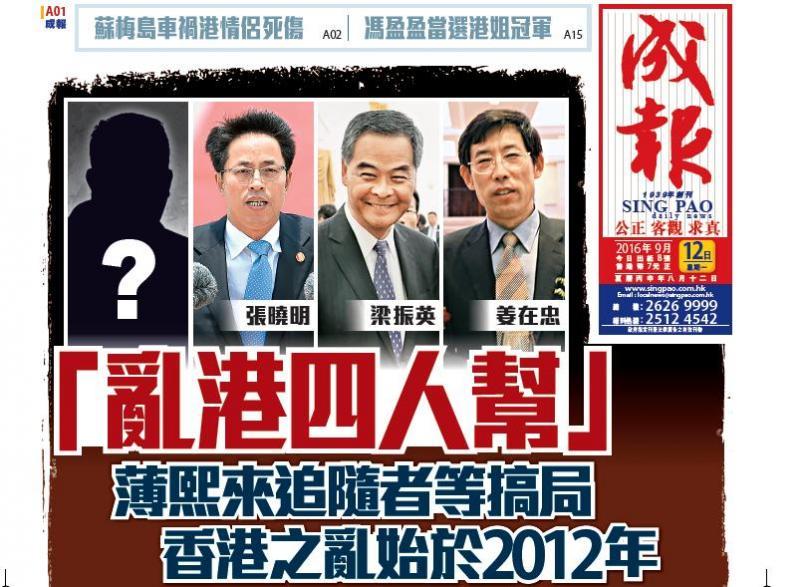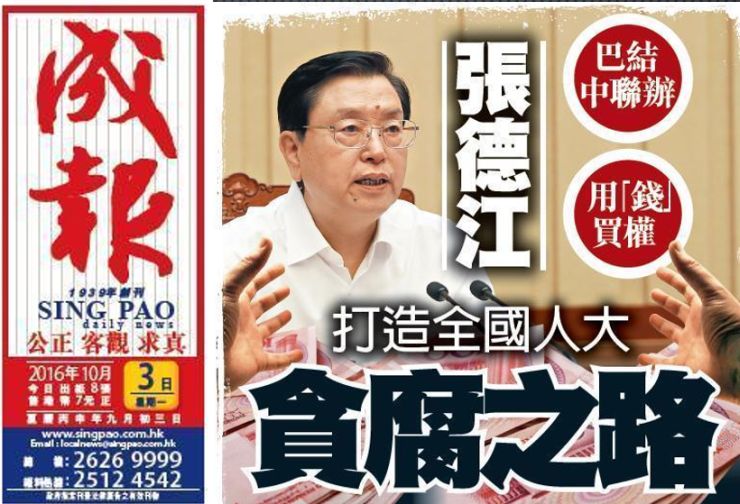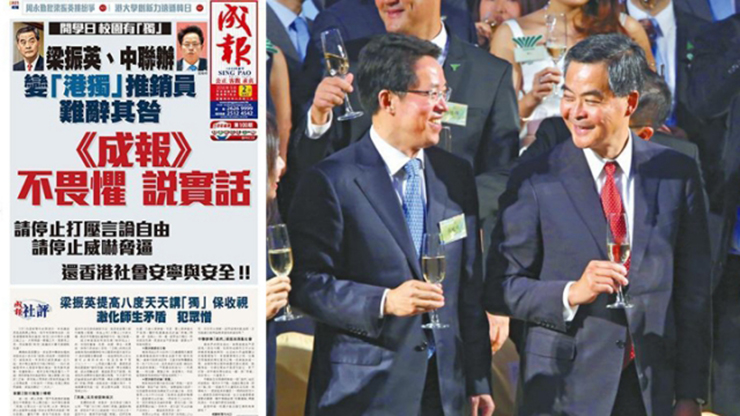The Pro-Beijing Sing Pao newspaper has carried a commentary on its front page denouncing the political syndicate associated with former China’s president Jiang Zemin for allowing the China Liaison Office to expand its network of cronies in Hong Kong.
Since late August, the Chinese-language newspaper has been running anonymous commentaries attacking Chief Executive Leung Chun-ying and Beijing’s powerful organ in Hong Kong, the Liaison Office. The move – and the fact that Beijing has shown little sign of censoring Sing Pao – has led to speculation that Hong Kong’s pro-Beijing camp is fissured and that Chinese President Xi Jinping is prepared to eradicate a powerful sector within the Communist Party.

Liaison Office’s ‘layers of interests’
Sing Pao’s latest anonymous commentary on Monday criticised Zhang Dejiang, chairman of the Standing Committee of the National People’s Congress, and Liao Hui, former director of the Hong Kong and Macau Affairs Office, for permitting the Liaison Office to expand its “layers of interests” in Hong Kong.
“Veteran politicians in Hong Kong know that in order to become a member of the Chinese People’s Political Consultative Conference [a united front organ of the Chinese Communist Party], they need to first curry favour with the Liaison Office and give them benefits to get their recommendations,” the newspaper wrote.
It gave an example of a local politician who wanted to obtain a position in the Communist Party’s consultative body. The politician invited Liaison Office representatives to a feast with sushi chefs with ingredients coming directly from Japan.
According to the commentary, members of the Liaison Office are picky eaters and frequent private kitchens and clubhouses to avoid publicity.

The newspaper added that Hong Kong’s anti-graft body is incapable of combating the network of cronies, since exchanges of benefits usually take place outside Hong Kong.
It said that many local politicians are disgruntled by the practice of giving benefits to the Liaison Office as a prerequisite to joining China’s political circle.
China’s factional warfare
Behind the influential Liaison Office is Zhang Dejiang, an ally of ex-leader Jiang Zemin who, according to Sing Pao, permits his political syndicate to continue corrupt practices across China.
Sing Pao accused Zhang of failing to halt vote-buying fraud within the Communist Party under his leadership. It cited recent election fraud in the National People’s Congress last month, which saw 45 members expelled from the party. However, analysts said that Beijing’s high-profile anti-corruption campaigns are more likely driven by factional warfare than a genuine attempt to combat corruption.

Sing Pao slammed Zhang for “feeling good about himself” despite the political fallout, and his attitude was “just like that of Chief Executive Leung Chun-ying and Zhang Xiaoming.”
Citing the vigorous anti-corruption campaign of China’s anti-graft body, the newspaper said: “It looks like the Central Commission for Discipline Inspection will soon be able to eradicate the ‘Sai Wan’ [where the China Liaison Office is located] syndicate.”
The paper concluded that the “National People’s Congress system must be greatly reformed” in order to uphold justice.
In August, Sing Pao ran a commentary criticising the chief executive of inciting the pro-independence movement to reinforce his power. In September, it declared Leung, the Liaison Office’s Zhang Xiaoming, Tai Kung Pao Chairman Jiang Zaizhong and another to be the “Gang of Four” trying to destabilise Hong Kong. It later implied that the fourth person was former chief executive Tung Chee-hwa.
Some analysts believe Sing Pao’s repeated anonymous critiques are meant to “bombard” Beijing with discontent and that they will not stop until Beijing finalises the list of candidates for Leung’s replacement in the 2017 chief executive election. Others believe it indicates factional infighting between the Jiang and Xi camps, with Leung belonging to the Jiang’s camp.

On Saturday, a magazine published by the Central Commission for Discipline Inspection ran a commentary by a Xinhua News Agency editor praising the international media’s “unbiased” coverage of China’s anti-corruption campaigns. The commentary also quoted Sing Pao’s editorial, which supported Beijing’s efforts in combatting corruption.
